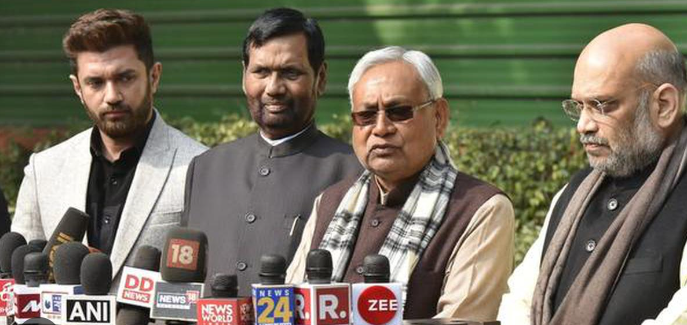Anil Malviya
Lucknow: In the political cauldron of Bihar’s assembly, the National Democratic Alliance (NDA) finds itself navigating through turbulent waters of seat-sharing negotiations. The recent announcement by Pasupati Paras of his candidacy from Hazipur on his party’s symbol has stirred the pot further. This move comes amidst unresolved discussions within the alliance, highlighting the underlying tensions that have been simmering since the 2019 elections.
Paras, alongside Prince Paswan from Samastipur and Chandan Singh, who seeks to defend his 2019 victory, represents a faction within the NDA that is prepared to assert its position. The declaration by Paras that he will not abandon Hazipur, regardless of the final seat-sharing agreement, underscores a resolute stance that could shape the alliance’s dynamics.
The NDA, a coalition of six parties, has been grappling with the challenge of appeasing each member’s aspirations while striving for a consensus that benefits the collective. The seat-sharing talks have been protracted, with each party vying for a significant share of the 40 Lok Sabha seats in Bihar. The Bharatiya Janata Party (BJP) is poised to contest on 17 seats, the Janata Dal (United) on 16, and the Lok Janshakti Party (LJP) led by Chirag Paswan on five seats.
The Rashtriya Lok Janshakti Party (RLJP), helmed by Union minister Pashupati Kumar Paras, faces the prospect of being content with a Rajya Sabha seat instead of a Lok Sabha berth. This development has been a source of contention, particularly for Paras, who has a vested interest in the Hazipur seat, a stronghold once held by his late brother Ram Vilas Paswan.
The seat-sharing conundrum has been further complicated by the ambitions of other NDA constituents like Upendra Kushwaha’s Rashtriya Lok Morcha (RLM) and Jitan Ram Manjhi’s Hindustani Awam Morcha Secular (HAMS), each eyeing a piece of the electoral pie.
The unfolding scenario in Bihar is a testament to the intricate balance of power and negotiation that characterizes coalition politics. As the NDA inches closer to finalizing its seat-sharing formula, the spotlight remains on Hazipur, where Paras’s unwavering resolve poses a significant test for the alliance’s unity and adaptability.
The past tensions over seat-sharing have been a recurring theme in the NDA’s narrative, often leading to eleventh-hour resolutions that barely conceal the fractures within. The current impasse is not just about the allocation of seats; it’s a reflection of the broader struggle for political relevance and survival in the ever-evolving landscape of Bihar’s politics.
As the NDA partners continue their deliberations, the outcome will not only determine the electoral prospects but also set the tone for the alliance’s future. Will the coalition emerge stronger from this trial, or will individual ambitions pave the way for a realignment of forces? Only time will tell, but one thing is certain: the road to consensus is fraught with hurdles, and the journey is as consequential as the destination itself.


